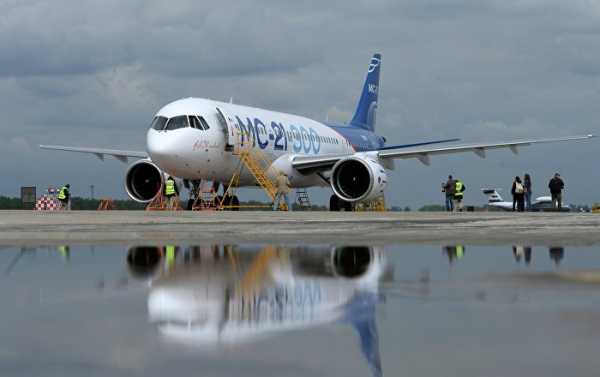
Russia has high hopes for the new MC-21 medium-range jetliner, expecting it to become more than a match for competitors like the Boeing-737 and Airbus A-320.
US sanctions against Aerocomposit and ORPE Technologiya, a pair of companies engaged in the development of the MC-21, have cut off access to US and Japanese components necessary for the production of the plane’s revolutionary composite wing design, Russia’s Kommersant business newspaper has reported, citing industry sources.
According to the newspaper, components for the plane’s wings and vertical stabiliser are produced by Hexcel, a US-based company and Toray Industries, a Japanese manufacturer. Russia currently has a stock of composite materials to build six more planes, and proposals to get around the problem are being actively discussed, one of Kommersant’s sources added.
“We will have to either take Chinese composite materials, which are two times thicker and heavier, or wait until Russian industry is able to create something similar,” the source said.
According to Kommersant, the Yelabuzhskiy Composite Materials Factory in Tatarstan, Russia is theoretically capable of creating the needed materials, but doing so will require time and resources for R&D and machine tools, which could push back the plane’s mass production to “at least 2025.”
Another option is assistance from Russian nuclear energy company Rosatom, which has an import substitution program and a composite materials division called Umatex, which has already agreed to participate in the development and testing of materials for the MC-21. However, according to Kommersant, Russia does not yet have enterprises capable of producing these materials.
A third option, proposed by the Central Aerohydrodynamic Institute and the Zhukovsky Institute, is to redesign the wing and vertical stabiliser using metal, which would reduce delays, but also threaten to “kill the composites, which were proposed as one of the main advantages of the airliner,” one of Kommersant’s sources said.
Speaking to reporters on Thursday, the office of Russian Deputy Prime Minister Yuri Borisov, whose portfolio includes defence and aerospace, stressed that there were no significant challenges to the MC-21 program caused by US sanctions.
“The Russian government is aware of everything happening with the MC-21 project. Currently there are no problems threatening the project,” the deputy prime minister’s office said.
Furthermore, Rostec, ORPE Technologiya’s holding company, called the problem “far-fetched”, adding that the Russian aviation industry faces no shortage of composite materials, sanctions notwithstanding.
“There are reliable foreign suppliers of composites; there are our own developments. The aircraft industry will not remain without the necessary materials in any case, and the abandonment of the use of composites in the MC-21 is not even under consideration,” Rostec explained.
The MC-21, a new short and medium-haul jetliner built by Irkut Corporation, a subsidiary of United Aircraft Corporation, is a major component in a broader effort by Russian aircraft builders to revive the country’s once mighty civilian aircraft industry.
Featuring a carrying capacity of between 130 and 220 passengers among its variants, the MC-21 has a range of 6,000 km. Developers, flight testers and industry officials have touted the aircraft’s advantages over competitors, including superior fuel consumption stats, lower maintenance requirements, higher cruising speed, more comfortable cabin pressure, climate control and noise isolation, as well as a price tag millions of dollars below that of competitors.
These characteristics are provided for by the planes airframe, engine and avionics systems design, including a composite wing design and the use of the PD-14 turbofan engine power plant, produced by Perm-based aircraft engine builder Aviadvigatel.
The MC-21 made its maiden flight in May 2017, and has been engaged in extensive testing. Expecting to receive certification from Russian civil aviation authorities this year, producers are hoping to get European Aviation Safety Agency certification in 2020.
Over 200 MC-21s have already been ordered by Russian airlines, including flag carrier Aeroflot. Hungary, Bangladesh and Syria have expressed interest in the aircraft, with India reportedly looking to domestically produce the airliner on license. Along with the domestic market, Irkut hopes to sell the plane extensively abroad, particularly among the BRICS group.
Sourse: sputniknews.com






